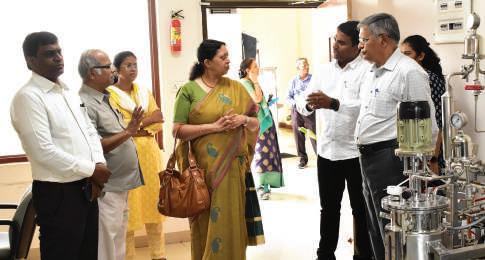
2 minute read
SIR CHANDRASEKHARA VENKATA RAMAN
from Neo Science Hub
by naresh nunna
Sir Chandrasekhara Venkata Raman, known as Sir CV Raman, was an Indian physicist who made groundbreaking contributions to the field of light scattering, for which he won the Nobel Prize in Physics in 1930. He was born on November 7, 1888, in Tiruchirappalli, Madras Presidency, British India (now Tamil Nadu, India), and passed away on November 21, 1970, in Bangalore, India
While he achieved great success in his career, he faced several struggles throughout his life. Here are some of the notable struggles that C V Raman encountered
Advertisement

Early Struggles and Failures
Financial Constraints: C.V. Raman's family faced financial difficulties during his early years His father was a lecturer in mathematics and physics at a college in Calcutta (now Kolkata), and the family had to manage with limited resources Despite these challenges, Raman's passion for science and determination to succeed remained strong.
Limited Access to Research Facilities: During his early career, Raman faced limitations in terms of research facilities and resources. In India, there were fewer opportunities for scientific research compared to Western countries Raman had to overcome these constraints and work with limited equipment and support to conduct his experiments
Resistance to Research: When Raman started his groundbreaking work on the scattering of light, he faced resistance from some members of the scientific community His theories challenged prevailing beliefs and encountered skepticism from established scientists However, Raman persisted in his research and eventually proved the validity of his findings
Lack of Recognition: Despite his significant contributions to the field of science, Raman did not receive the recognition he deserved early in his career. It was only after the publication of his seminal paper on the Raman effect in 1928 that his work gained international acclaim. In 1930, he became the first Asian scientist to be awarded the Nobel Prize in Physics for his discovery.
Independence Struggle: Raman was actively involved in India's struggle for independence from British colonial rule He participated in various activities supporting the independence movement, including organizing and delivering speeches on nationalistic themes. His involvement in political matters sometimes resulted in conflicts with the British authorities Despite these struggles, C V Raman's determination, perseverance, and scientific brilliance allowed him to make significant contributions to the field of physics His discovery of the Raman effect revolutionized the understanding of light and its interaction with matter, establishing him as one of the greatest scientists of his time.
Success Story
Sir CV Raman achieved remarkable success in his scientific career and made significant contributions to the field of physics His notable successes include:
Discovery of the Raman Effect: Raman's groundbreaking discovery of the scattering of light and the resulting change in wavelength, known as the Raman Effect, earned him the Nobel Prize in Physics in 1930 This discovery revolutionized the understanding of the interaction between light and matter and had far-reaching implications for various scientific disciplines
Advancements in Optical Spectroscopy: Raman's work on the Raman Effect laid the foundation for the development of the field of Raman spectroscopy This technique became an essential tool for analyzing the molecular structure and composition of substances Raman spectroscopy has since found applications in diverse areas, including chemistry, materials science, biology, and medicine
Promoting Scientific Research in India: Raman played a pivotal role in promoting scientific research and education in India. He established the Indian Academy of Sciences using his Nobel Prize money, which became an important institution for fostering scientific inquiry in the country. He also served as the Director of the Indian Institute of Science, where he facilitated the growth of scientific research and infrastructure.
Inspiring Future Generations: Raman's achievements and dedication to science continue to inspire countless scientists and students in India and beyond. His contributions have had a lasting impact on the scientific community and have motivated many to pursue careers in scientific research and innovation.
- NSH






